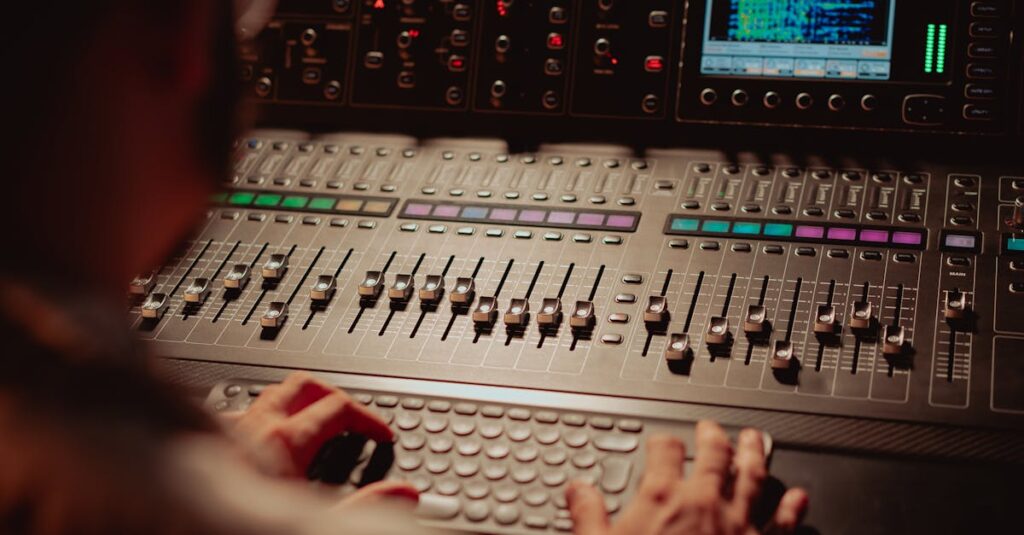Music production offers an exciting blend of creativity and technical expertise in today’s dynamic entertainment industry. From recording studios to live venues professionals in this field shape the soundscapes that define modern music while working with talented artists to bring their vision to life.
The music production industry has evolved dramatically with technological advances creating diverse career paths for aspiring professionals. Whether it’s working as a studio producer mixing engineer or sound designer there’s a growing demand for skilled individuals who can navigate both traditional and digital production tools. These careers combine artistic vision with technical knowledge offering opportunities in recording studios film production companies gaming studios and independent freelance work.
Careers in Music Production
Music production encompasses the technical creation of recorded music from composition to final mixing. A music producer oversees the recording process recording methods artist performance sound design mixing mastering.
Core Components of Music Production
- Recording captures live performances using microphones audio interfaces digital workstations
- Editing arranges recorded tracks removes errors adjusts timing pitch
- Mixing balances multiple audio tracks adjusts effects creates stereo image
- Mastering optimizes final audio for different playback systems distribution formats
Career Benefits in Music Production
Financial Opportunities
| Role | Average Annual Salary (USD) |
|---|---|
| Studio Producer | $54,000 – $98,000 |
| Mixing Engineer | $45,000 – $72,000 |
| Sound Designer | $48,000 – $85,000 |
| Mastering Engineer | $42,000 – $75,000 |
Industry Growth Indicators
- Digital streaming platforms create constant demand for new content
- Gaming industry requires specialized audio production expertise
- Virtual reality applications need immersive sound design
- Social media content creation demands quality audio production
- Technical proficiency in digital audio workstations (Pro Tools Logic Studio One)
- Understanding of audio engineering principles acoustics sound physics
- Knowledge of music theory arrangement composition
- Expertise in analog digital equipment operation maintenance
- Project management client communication business operations
Music production combines creative expression with technical precision in a rapidly evolving digital landscape. The field offers diverse career paths from studio work to independent production across multiple entertainment sectors.
Key Skills Needed for Music Production
Music production demands a diverse skill set that combines technical proficiency with artistic sensibility. Success in this field requires mastery across three fundamental areas.
Technical Expertise
Professional music producers demonstrate expertise in digital audio workstations (DAWs) like Pro Tools, Logic Pro X, and Ableton Live. This expertise includes:
- Operating mixing consoles with precision control over EQ, compression, and effects
- Configuring audio interfaces, MIDI controllers, and monitoring systems
- Managing signal flow through analog and digital recording equipment
- Troubleshooting technical issues in recording sessions
- Applying advanced audio processing techniques like automation, side-chaining, and bus processing
Musical Knowledge
Strong musical foundations enhance a producer’s ability to communicate with artists and shape compositions effectively:
- Reading musical notation and understanding chord progressions
- Identifying key signatures, time signatures, and tempo markers
- Recognizing different musical genres and their production conventions
- Playing at least one instrument proficiently
- Arranging instrumental and vocal parts for optimal sonic impact
- Negotiating contracts and licensing agreements
- Managing project timelines and budgets effectively
- Building professional networks within the industry
- Marketing services through digital platforms and industry contacts
- Protecting intellectual property rights through proper documentation
- Setting competitive rates based on market standards
- Maintaining professional relationships with clients and collaborators
Popular Careers in Music Production Paths
The music production industry offers diverse career opportunities across multiple sectors. Each role requires specific technical expertise combined with creative abilities to shape the sonic landscape of various media formats.
Recording Engineer
Recording engineers operate studio equipment to capture high-quality audio recordings. They set up microphones, adjust sound levels, operate mixing consoles, and maintain recording equipment while collaborating with artists to achieve optimal sound quality. The average recording engineer earns $42,000-$65,000 annually, with opportunities in professional recording studios, broadcast facilities, and live venues.
Key responsibilities include:
- Configuring audio interfaces and preamps for recording sessions
- Positioning microphones for optimal sound capture
- Operating Pro Tools or similar DAWs during sessions
- Maintaining studio equipment and troubleshooting technical issues
- Creating backup systems for recorded material
Music Producer
Music producers oversee the entire production process from concept to final delivery. They guide artistic direction, manage recording sessions, and ensure projects meet quality standards while staying within budget constraints. Top music producers earn $54,000-$98,000 annually, with additional income through royalties and project fees.
Primary duties include:
- Arranging musical compositions and suggesting creative improvements
- Coordinating recording schedules with artists and musicians
- Managing studio resources and personnel
- Selecting appropriate recording techniques and equipment
- Overseeing mixing and mastering processes
Sound Designer
Sound designers create and manipulate audio elements for various media platforms. They develop unique sound effects, ambient backgrounds, and sonic environments for films, video games, and interactive media. Professional sound designers earn $48,000-$85,000 annually, with opportunities in gaming studios, post-production houses, and entertainment companies.
- Creating custom sound effects using synthesis and recording techniques
- Developing audio assets for different platforms and formats
- Programming interactive audio systems
- Collaborating with directors and game developers
- Implementing spatial audio for virtual environments
Education and Training Requirements
Music production careers demand a combination of formal education and hands-on experience to master the technical and creative aspects of the field.
Formal Education Options
A bachelor’s degree in music production, audio engineering, or music technology provides comprehensive training in essential skills:
- Four-year degree programs from accredited institutions like Berklee College of Music teach advanced recording techniques
- Two-year associate degrees focus on foundational audio engineering principles at institutions like Full Sail University
- Professional certifications from Avid Pro Tools enhance career prospects in studio environments
- Specialized courses in sound design from institutions like SAE Institute cover industry-specific software
- Music business programs incorporate essential contract negotiation and copyright law knowledge
| Degree Type | Average Duration | Focus Areas |
|---|---|---|
| Bachelor’s | 4 years | Production, Engineering, Business |
| Associate’s | 2 years | Technical Skills, Basic Theory |
| Certificate | 6-12 months | Specific Software, Equipment |
- Online courses through platforms like Coursera partner with leading music schools
- YouTube channels from professional producers demonstrate practical techniques
- Digital Audio Workstation tutorials from manufacturers provide software mastery
- Industry forums like Gearslutz connect learners with experienced professionals
- Project-based learning platforms like LinkedIn Learning offer structured courses
| Resource Type | Learning Format | Cost Range |
|---|---|---|
| Online Courses | Video Lessons | $0-500 |
| DAW Tutorials | Interactive | $20-200 |
| Forums | Community-based | Free |
| Professional Workshops | Live/Virtual | $300-1,500 |
Breaking Into the Music Industry
The music industry values demonstrated experience alongside formal education. Entry-level professionals establish their presence through strategic portfolio development networking activities.
Building Your Portfolio
A strong portfolio showcases technical expertise through diverse music production projects. Essential portfolio elements include:
- Create 3-5 fully produced tracks in different genres
- Document studio recording sessions with professional artists
- Include before-after examples of mixing work
- Showcase sound design samples for various media
- Feature collaborative projects with other producers
- Add testimonials from clients or collaborators
The portfolio format combines:
- Online streaming platforms (SoundCloud Spotify)
- Professional website with downloadable samples
- Video documentation of studio work
- Digital press kit with project descriptions
Networking Strategies
Music industry connections lead to project opportunities career advancement. Effective networking approaches include:
- Attend industry conferences (NAMM AES) to meet equipment manufacturers producers
- Join professional organizations:
- Recording Academy (Grammy organization)
- Audio Engineering Society
- Production Music Association
- Engage in online communities:
- Gearslutz Pro Audio Forum
- Reddit’s WeAreTheMusicMakers
- LinkedIn Music Production Groups
- Participate in local music scenes:
- Volunteer at recording studios
- Connect with venue sound engineers
- Collaborate with independent artists
- Attend producer meetups workshops
| Activity | Monthly Target |
|---|---|
| Industry Events | 2-3 |
| Online Forum Posts | 15-20 |
| Professional Meetings | 4-5 |
| Collaboration Projects | 1-2 |
Income Potential and Job Outlook
Music production offers dynamic income opportunities across multiple industry segments. Entry-level producers earn $35,000-$45,000 annually, while experienced professionals command $90,000-$150,000. Top-tier producers generate additional revenue through royalties, performance rights payments, and production credits.
| Role | Entry Level | Mid-Career | Senior Level |
|---|---|---|---|
| Studio Producer | $35,000 | $65,000 | $150,000+ |
| Mixing Engineer | $32,000 | $58,000 | $95,000 |
| Sound Designer | $38,000 | $62,000 | $110,000 |
| Mastering Engineer | $35,000 | $55,000 | $98,000 |
Employment projections indicate a 7% growth rate in music production roles through 2030. Key growth drivers include:
- Expanding streaming platforms creating demand for original content
- Rising podcast production requiring audio expertise
- Gaming industry growth generating sound design opportunities
- Virtual reality applications needing specialized audio production
- Live event production incorporating complex audio systems
Income variations depend on:
- Geographic location with major music hubs offering higher rates
- Technical specialization in emerging audio technologies
- Project complexity ranging from indie productions to major label releases
- Industry connections leading to recurring client relationships
- Portfolio strength demonstrating successful commercial projects
Freelance producers generate additional revenue streams through:
- Session work at $50-$150 per hour
- Track licensing fees ranging from $500-$5,000
- Production credit royalties at 3-5% per project
- Online beat sales averaging $100-$500 per track
- Equipment rental services generating passive income
The entertainment industry expansion creates consistent demand for qualified music production professionals. Remote work opportunities increase income potential beyond local market limitations.
Diverse Opportunities
A career in music production offers diverse opportunities for those passionate about shaping the sonic landscape of entertainment. The field continues to evolve with technological advancements creating new roles and income streams across multiple sectors.
Success in this dynamic industry requires a blend of technical expertise creative vision and business acumen. Whether pursuing work in recording studios gaming companies or as freelance producers professionals can expect competitive salaries and growth potential in an expanding market.
The future of music production remains bright with emerging technologies and platforms creating sustained demand for skilled professionals. Those who combine formal education hands-on experience and strong networking skills will find themselves well-positioned for rewarding careers in this exciting field.



